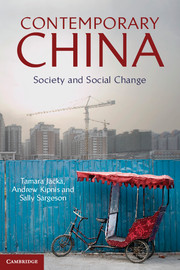Book contents
- Frontmatter
- Contents
- List of Images
- List of Maps
- List of Figures
- List of Tables
- Acknowledgments
- List of Abbreviations
- Map 0.1: China's provinces and provincial capitals
- Introduction
- Part 1 Social Institutions
- 1 Families, Kinship and Relatedness
- 2 Marriage, Intimacy and Sex
- 3 Citizenship, Household Registration and Migration
- 4 Community Institutions
- 5 Work
- Part 2 Cultures, Socialization and the Formation of Identities
- Part 3 Inequalities, Injustices and Social Responses
- Glossary of Chinese Terms
- References
- Index
5 - Work
Published online by Cambridge University Press: 05 June 2014
- Frontmatter
- Contents
- List of Images
- List of Maps
- List of Figures
- List of Tables
- Acknowledgments
- List of Abbreviations
- Map 0.1: China's provinces and provincial capitals
- Introduction
- Part 1 Social Institutions
- 1 Families, Kinship and Relatedness
- 2 Marriage, Intimacy and Sex
- 3 Citizenship, Household Registration and Migration
- 4 Community Institutions
- 5 Work
- Part 2 Cultures, Socialization and the Formation of Identities
- Part 3 Inequalities, Injustices and Social Responses
- Glossary of Chinese Terms
- References
- Index
Summary
Work is the subject of a great deal of research in China. Yet it is fair to say that most of this research is quite narrowly focused and overlooks many forms of work. Three terms in Chinese are commonly used to refer to work: laodong, dagong and gongzuo. First, there is labor, work or toil (laodong), which refers to the action of transforming nature, creating products or performing services. The term can therefore be used to describe many things, from activities that involve coercion to the growing of food for personal consumption, cooking, cleaning and caring for others in a home, to volunteering, self-employment or paid employment. Second, temporary or seasonal employment (dagong) may involve physical effort. Third, if a person has a “proper job” (gongzuo) they are typically employees (zhigong, literally “staff and workers”) within enterprises, professions or the civil service. The bulk of research into work in China has focused on gongzuo and dagong in enterprises. Less attention has been paid to the work done in China's huge civil service, the armed forces and the media, and nor has much research been conducted on the many activities referred to as laodong, including bonded and child labor, sex work, farmwork, volunteer community service and unpaid domestic work. Owing to the scarcity of evidence, this chapter also says little about these latter forms of work.
- Type
- Chapter
- Information
- Contemporary ChinaSociety and Social Change, pp. 105 - 124Publisher: Cambridge University PressPrint publication year: 2013

